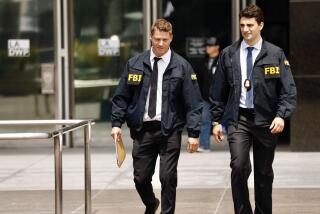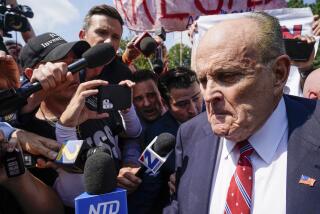Douglas Dowie’s Lawyers Seek to Get His Ex-Employer to Pay His Legal Bills
- Share via
Douglas Dowie, the former public relations executive whose criminal case helped tar the administration of former Los Angeles Mayor James K. Hahn, owes his lawyers almost $3 million.
They were in court Monday, trying one more time to save Dowie from a stiff prison term next month and maybe shake loose payment for services rendered too.
Dowie, the former managing editor of the Daily News of Los Angeles, was accused of defrauding the city by submitting false billings for consulting work done by his employer, Fleishman-Hillard, the international public relations firm. The firm repaid the city $6 million for bills submitted by Dowie’s Los Angeles office, and Dowie, a onetime Hahn confidant, and an aide were convicted last summer of fraud and conspiracy.
In an eleventh-hour legal maneuver, Dowie claimed that Fleishman effectively threw him to the wolves in order to avoid a direct indictment of the company itself. He was therefore deprived of his constitutional rights, his lawyers argued.
Those arguments did not impress U.S. District Judge Gary Feess, who presided over the trial and turned away Dowie’s plea last month for acquittal or a new trial.
On Monday, however, the lawyers tried a slightly different tack. Fleishman paid almost $1 million for Dowie’s legal fees in the beginning of the investigation. But the firm stopped paying the bills in June 2005 after Dowie was indicted and he filed a lawsuit claiming Fleishman wrongly fired him.
The law firm Gibson Dunn & Crutcher continued to provide an aggressive defense despite the unpaid bills, providing three top trial lawyers for his lengthy trial.
The defense nevertheless claimed that the cutoff at a critical point in the federal investigation worked to deprive Dowie of his constitutional right to counsel, and also to deprive him of due process of law.
The defense argument comes against a backdrop of criticism of a U.S. Department of Justice policy adopted after the Enron scandal to encourage corporations to cooperate in financial fraud investigations.
The policy lists nine factors that prosecutors take into account in deciding whether to indict a corporation, including the company’s willingness to waive the attorney-client privilege, and to cut off legal fees for company officers under suspicion.
Critics contend that the policy has been misused by over- aggressive prosecutors, but the policy has been invoked in dozens of fraud cases.
The debate came to a head in a case involving allegedly fraudulent tax shelters created by the accounting firm KPMG. U.S. District Judge Lewis A. Kaplan in New York found that the firm violated employees’ right to counsel by limiting legal fees in a bid to gain favorable treatment from prosecutors.
But on Monday, Feess was openly skeptical of defense attempts to apply the KMPG ruling to Dowie. Feess said the New York case was unique, and added that an employer “has no obligation to indemnify employees for illegal acts.”
Feess noted that Fleishman-Hillard paid for much of the defense of Dowie’s co-defendant, John Stodder Jr. He said that “the primary factor” in cutting off Dowie’s fees was probably his decision to file a lawsuit against his former employer. That lawsuit was dismissed last summer after a judge ruled the company had “good cause” to fire Dowie, and found his claim that he was a whistle-blower to be “a sham.”
Feess said he would rule on the motion in a week, and set Dowie’s sentencing for Nov. 13.
*
More to Read
Sign up for Essential California
The most important California stories and recommendations in your inbox every morning.
You may occasionally receive promotional content from the Los Angeles Times.













